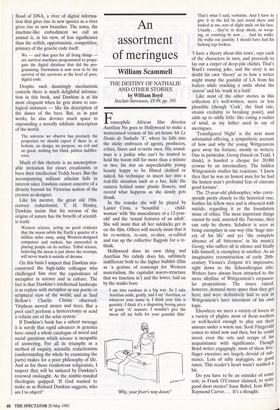An assortment of meringues
William Scammell
THE DESTINY OF NATHALIE AND OTHER STORIES by William Boyd Sinclair-Stevenson, £9.99, pp. 195 Fancophile African film director Aurelian No goes to Hollywood to make a westernised version of his art-house hit Le Destin de Nathalie 'X', where he falls into the sticky embraces of agents, producers, critics, fixers and re-write men. His sound- man is a junkie who can't be trusted to hold the boom still for more than a minute or two, his star an unpredictable young beauty happy to be filmed clothed or naked, his technique to insert her into a real-life situation such as a bar, hide the camera behind some plastic flowers, and record what happens as she slowly gets drunk.
In the remake she will be played by Lanier Cross, a 'beautiful . . . child- woman' with 'the musculature of a 12-year- old' and the 'sexual features of an adult'. She will insist that all her sidekicks get in on the film. Others will merely insist that it be re-written, re-cast, re-shot, re-edited and run up the collective flagpole for a re- think.
Hollywood does its own thing and Aurelian No calmly does his, sublimely indifferent both to the higher bullshit (film as 'a gesture of contempt for Western materialism, the capitalist macro-structure that we function in') and the lower, laid on by the studio boss: I am into candour in a big way. So I take Aurelian aside, gently, and I say 'Aurelian, or whatever your name is, I think your film is goatshit. I think it's a disgusting boring piece of grade 'A' manure. I wouldn't give the sweat off my balls for your goatshit film.'
`Why, your fever's way down!' That's what I said, verbatim. And I have to give it to the kid he just stood there and looked at me, sort of slight smile on his face. Usually . .. they're in deep shock, or weep- ing, or vomiting by now . . . And he walks. He walks out jauntily. I should have had his fucking legs broken.
'I have a theory about this town', says each of the characters in turn, and proceeds to lay out a carpet of deep-pile clichés. That's Boyd's running joke, and the story is no doubt his own 'theory' as to how a writer might stamp the goatshit of LA from his loafers while cracking a smile about the 'auteur' and his 'wank in a bath'.
Like most of the other stories in this collection it's well-written, more or less plausible (though 'Cork', the final tale, strains credulity to breaking point), and adds up to oddly little: like eating a rasher of wind, as my father used to say of meringues.
`Transfigured Night' is the next most substantial offering, a sympathetic account of how and why thd young Wittgenstein gave away his fortune, mostly to writers. One in particular, Georg (based on Trakl, I think), is handed a cheque for 20,000 crowns by an intermediary. The hidden Wittgenstein studies his reactions. 'I knew then that he was an honest man for he had the honest man's profound fear of extreme good fortune'.
The 25-year-old philosopher, who corre- sponds pretty closely to the historical one, loathes his fellow men and is obsessed with suicide, regarding it as the foundation stone of ethics. The most important things cannot be said, asserted the Tractatus, they can only be shown. Schubert is seen as being exemplary in one way (the 'huge mis- ery of his life' and yet 'the complete absence of all bitterness' in his music), Georg, who suffers all in silence and finally kills himself, is exemplary in another. As an imaginative reconstruction of early 20th- century Vienna's Zeitgeist it's impressive, right down to the Schoenbergian title. Writers have always been attracted to the more sibylline of Wittgenstein's crepuscu- lar propositions. The issues raised, however, demand more space than they get here; and were definitively laid to rest in Wittgenstein's later interment of his own logic. Elsewhere we meet a variety of lovers in a variety of plights, most of them rootless or well-heeled enough to play out their amours under a warm sun. Scott Fitzgerald comes to mind now and then, but he could invest even the orts and scraps of his acquaintance with significance. Though Boyd writes engagingly, most of these five- finger exercises are largely devoid of sub- stance. Lots of nifty arpeggios, no good tunes. This reader's heart wasn't scathed a bit.
Do you have to be an outsider of some sort, as Frank O'Connor claimed, to write good short stories? Isaac Babel, Jean RhYs, Raymond Carver. . . It's a thought.


































































 Previous page
Previous page